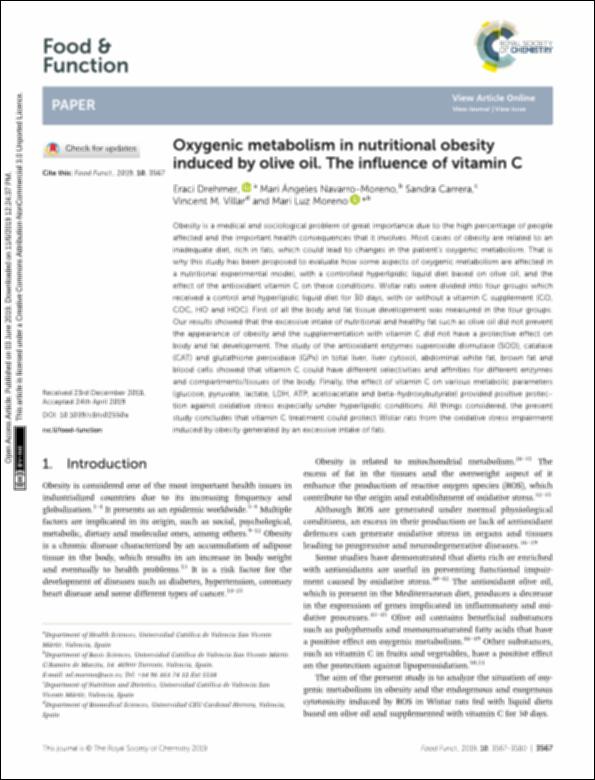Por favor, use este identificador para citar o enlazar este ítem:
http://hdl.handle.net/10637/10823Oxygenic metabolism in nutritional obesity induced by olive oil : the influence of vitamin C
| Título : | Oxygenic metabolism in nutritional obesity induced by olive oil : the influence of vitamin C |
| Autor : | Drehmer Rieger, Eraci Navarro Moreno, María Ángeles Carrera Juliá, Sandra Villar Amigó, Vicente Moreno Sancho, María Luz |
| Materias: | Antioxidantes.; Antioxidants.; Vitamin C.; Metabolismo - Trastornos.; Metabolism - Disorders.; Estrés oxidativo.; Oxidative stress.; Obesidad.; Obesity.; Vitamina C. |
| Editorial : | Royal Society of Chemistry. |
| Citación : | Drehmer, E., Navarro-Moreno, MA., Carrera, S., Villar, VM. & Moreno, ML. (2019). Oxygenic metabolism in nutritional obesity induced by olive oil : the influence of vitamin C. Food & Function, vol. 10, n. 6 (3 jun.), pp. 3567-3580. DOI: https://doi.org/10.1039/C8FO02550A |
| Resumen : | Obesity is a medical and sociological problem of great importance due to the high percentage of people affected and the important health consequences that it involves. Most cases of obesity are related to an inadequate diet, rich in fats, which could lead to changes in the patient’s oxygenic metabolism. That is why this study has been proposed to evaluate how some aspects of oxygenic metabolism are affected in a nutritional experimental model, with a controlled hyperlipidic liquid diet based on olive oil, and the effect of the antioxidant vitamin C on these conditions. Wistar rats were divided into four groups which received a control and hyperlipidic liquid diet for 30 days, with or without a vitamin C supplement (CO, COC, HO and HOC). First of all the body and fat tissue development was measured in the four groups. Our results showed that the excessive intake of nutritional and healthy fat such as olive oil did not prevent the appearance of obesity and the supplementation with vitamin C did not have a protective effect on body and fat development. The study of the antioxidant enzymes superoxide dismutase (SOD), catalase (CAT) and glutathione peroxidase (GPx) in total liver, liver cytosol, abdominal white fat, brown fat and blood cells showed that vitamin C could have different selectivities and affinities for different enzymes and compartments/tissues of the body. Finally, the effect of vitamin C on various metabolic parameters (glucose, pyruvate, lactate, LDH, ATP, acetoacetate and beta-hydroxybutyrate) provided positive protection against oxidative stress especially under hyperlipidic conditions. All things considered, the present study concludes that vitamin C treatment could protect Wistar rats from the oxidative stress impairment induced by obesity generated by an excessive intake of fats. |
| Descripción : | Este es el artículo que se ha publicado de forma definitiva en: https://pubs.rsc.org/en/content/articlepdf/2019/fo/c8fo02550a |
| URI : | http://hdl.handle.net/10637/10823 |
| Derechos: | http://creativecommons.org/licenses/by-nc/4.0/deed.es |
| ISSN : | 2042-6496. 2042-650X (Electrónico). |
| Fecha de publicación : | 3-jun-2019 |
| Centro : | Universidad Cardenal Herrera-CEU |
| Aparece en las colecciones: | Dpto. Ciencias Biomédicas |
Los ítems de DSpace están protegidos por copyright, con todos los derechos reservados, a menos que se indique lo contrario.


